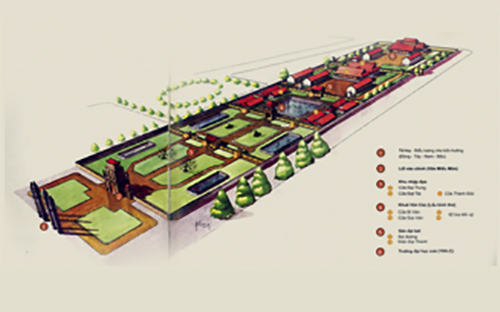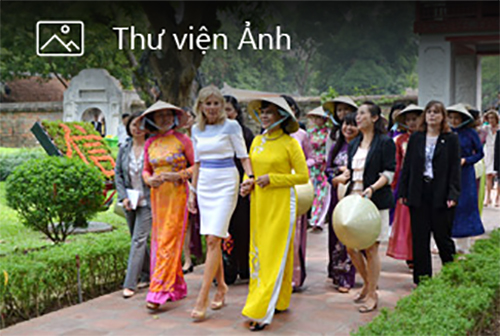Life and career of Scholar Chu Van An through history written by Imperial court and private documents
The ancient documents (history written by Imperial court and private documents) wrote about the life and career of Chu Van An.
I. The first historical book written about Chu van An was Đại Việt sử ký toàn thư (Complete Annals of Dai Viet). The writers wrote about the life and career of Chu Van An during the recession society of Tran dynasty (the 13th – 14th century).
The following historical books such as: Đại Việt sử ký tiền biên under Tay Son dynasty, Khâm định Việt sử thông giám cương mục under Nguyen dynasty, and works of writers such as: Nam Ông mộng lục – Ho Nguyen Trung, Kiến văn tiểu lục - Le Quy Don, Hoàng Việt thi tuyển – Bui Huy Bich…also used information from Đại Việt sử ký toàn thư to write about Chu Van An.
Records about Chu Van An in the history written by Imperial court and private documents:
1. Chu Van An was born in Thanh Liet commune, Thanh Đam district, which now is part of Thanh Tri, Ha Noi. He died in 1370 at Phuong Hoang mountain, Chi Linh province (now part of Van An precinct), Chi Linh town, Hai Duong province. Chu Van An is the first Vietnamese Confucian scholar to be worshiped in The Temple of Literature by King Tran Nghe Tong. He is also worshipped in many places throughout the country.
2.Chu Van An was straightforward, talented and a virtuous teacher and scholar under Tran dynasty. He was known for being straight forward and not being concerned with fame and advantages. During the Tran Du Tong Dynasty (1341-1369) the affairs of the court were not good. Mandarins abused their power, so Chu Van An submitted a petition requesting the killing of seven bad madarins. Unfortunately, the King did not reply to his petition. Chu Van An resigned and lived in seclusion in Kiet Đac hill of Chi Linh district, Hai Duong province.
The Vietnamese historians and scholars all respect his frank manner and honoured him as the venerated educator.
3. Chu Van An studied by himself for many years and became an outstanding educator who made great contributions in education for Viet Nam.
It was said that Chu Văn An was awarded the title Thai Hoc Sinh (doctor degree) under the Tran dynasty. However, he did not work as a mandarin,. He founded a private school to train many talents for the nation, including Pham Su Manh and Le Ba Quat who worked at the court as Nhập nội hành khiển (chief mandarin) under Tran dynasty. His students always paid respect to him because he was full of integrity. His students, some of whom were even a minister or prime-minister, treated him as teacher, and those who were invited in usually knelt to listen to him. Those who were not good mandarins would be driven away.
After he resigned and came to live in seclusion in Kiet Đac hill of Chi Linh district, Hai Duong province.
King Tran Minh Tong (1314-1329) invited him to the Capital to instruct Tran Vuong crown prince (who later became the King Tran Hien Tong ) and appointed him as Tư nghiệp(Director) of Quoc Tu Giam, looking after the training in Quoc Tu Giam and ceremony in the Temple of Literature.
All the ancient books noted that in 1370, he died at the age of 79. King Tran Nghe Tong was so upset, he gave Chu Van An the posthumous name “Khang tiet”, awarded him the title Văn Trinh Công and ordered him honoured in the Temple of Literature. Chu Văn An is the first Vietnamese Confucian scholar to be worshiped in the Temple of Literature.
Chu Van An spent his life for education and training talents for the nation. He continues to be respected as the everlasting teacher of generations.
4.Chu Văn An wrote Tứ thư thuyết ước as the textbook for students.
II. Decoding the life and achievement of Chu Van An.
Firstly about his name, from Nguyen dynasty in the time King Tu Duc (1848-1883) all the historians wrote about his name being Chu Van An.
Secondly about the year he was born. Historical documents do not write about his birthday, only his death day in 1370. So now we should research more.
We should research about whether he was awarded the title Thai Hoc Sinh (doctor degree) under the Tran dynasty or not.
In a word, Chu Van An always worried about country and training talents (including the princes and students from different parts of country under 14th century.
Writer: Doctor Nguyen Huu Tam – Institute of History
Excerpted from Science Seminar “Chu Van An scholar – Life and career”














 Guide to finding the way
Guide to finding the way
